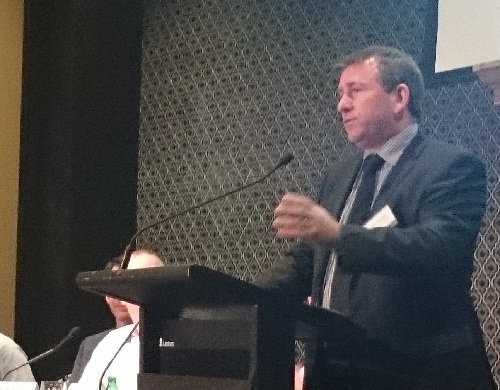IoT could 'smash' Australia's regulatory framework

Australia's regulatory landscape could be damaged by the demands of the emerging Internet of Things (IoT) sector, according to Australia's Communications Alliance CEO John Stanton.
"There is a real risk that elements of the current regulatory framework will be smashed or torn asunder by the demands that the Internet of Things will place on it," said Stanton during a panel session at the Communications Alliance's Rewind/Fast Forward event in Sydney.
While forecasts vary, there is -- according to the Communications Alliance -- a generally held view that the number of connected IoT devices will grow to within the region of 30 billion by 2020, equating to a five-fold increase over the number of connected devices today.In a bid to help alleviate the pressures that the rapidly growing IoT market is expected to put on Australia's existing regulatory framework, the Communications Alliance is establishing a new think tank aimed at nutting out these issues, among other pressing matters such as security concerns around the emerging technology.
"One of the things we wanted to look at was whether the regulatory framework in Australia is appropriate for the demands that are going to be placed on it by the Internet of Things, and demonstrably, I think the answer is, in many respects, no," said Stanton, who announced the think tank at the event on Wednesday. "There is a real risk that elements of the current regulatory framework will be smashed or torn asunder by the demands that the Internet of Things will place on it."
Latest Australian news
The proposed think tank, which Stanton said would include input from some of the local technology industry's largest players, will focus on addressing regulatory and other enablers or inhibitors locally, and identifying opportunities for Australian companies to be early beneficiaries of new business models through the emergence of IoT.
"Another thing we want to ask is: Is there a vertical, or verticals, in which Australia can be a leader, or develop an export capability, or become a niche specialist, such that we've got a sustainable role to play as this phenomenon develops globally?" said Stanton.
The IoT initiative will examine technology enablers, business drivers, and regulatory enablers, such as roaming rules, numbering schemes, data sovereignty, identity management, privacy, access security, and spectrum allocation.
Meanwhile, Internode co-founder Simon Hackett, who also spoke at the event, suggested that the security concerns associated with the ballooning number of internet-connected devices globally would be ably dealt with by the same processes and technology involved in protecting today's IT systems and smartphones.
"I'm not trying to trivialise it, but I think it's actually a problem that exists in the experience of the computer industry ... the software industry will use its existing technology and processes for IoT security in things like cars," he said. "Making smartphones safe will help us make IoT safe."
